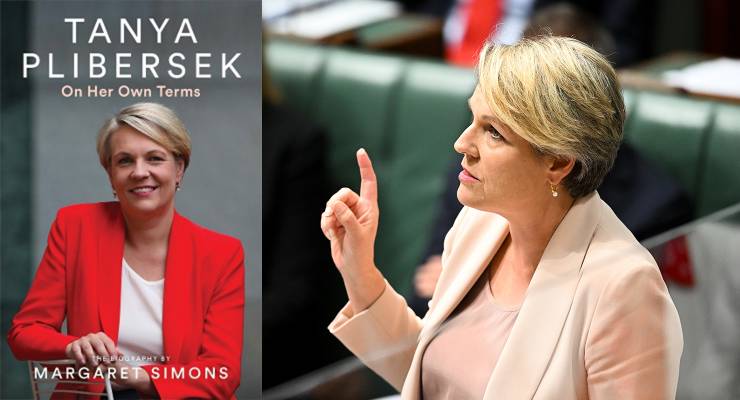
Margaret Simons has followed her well-received biography of Penny Wong with one on the other feminist star in Labor’s firmament, Tanya Plibersek.
Plibersek was a reluctant subject. She did not want people to think the biography, Tanya Plibersek: On Her Own Terms, was part of a publicity campaign for the leadership. But as the biography would be written anyway, she cooperated, offering introductions to former and present staff, friends and family, and eight interviews of her own. The voices of those who know her well, especially her family and close friends, give the biography an appealing intimacy.
Plibersek was blessed with a stable and happy childhood. Her parents, both born in Slovenia, met and married here in Australia. They were practising Catholics and their three children developed a strong ethical sense with a commitment to the common good, compared with what Plibersek would later describe as “the state-led selfishness” of neoliberalism.
Her parents also gave her an interest in politics and literature. She loves Jane Austen and identifies with the clever, sensible Elinor Dashwood in Austen’s Sense and Sensibility. When the family could afford it, they travelled regularly back to Slovenia. All of this has given Plibersek the poise, confidence and cultural capital of a middle-class upbringing, but her father, Joe, was a plumber, and unlike many of her cabinet colleagues, she went to the local public school, where she was taught by a strong cohort of feminist teachers.
Plibersek joined the Labor Party when she was 15, left about a year later over the Hawke government’s 1984 decision to allow uranium mining in Australia, and re-joined in 1993 while working in the NSW ministry for the status and advancement of women.
Four years later she contested and won preselection for the safe Labor seat of Sydney. She was only 29, up against more experienced candidates with better claims to the seat, but she personally visited the branch members, talking with them at length about their concerns, and so won the ballot. During the campaign, her brother, Philip, was murdered in PNG. Despite the shock and grief, she kept going, an answer Simons writes to those who doubt her toughness.
A theme of the book is the tension between Plibersek and Prime Minister Anthony Albanese, who did not make himself available for an interview. They are seen within the party and by the media as rivals, and before the last election, when a Labor victory was uncertain, some were agitating for her to replace Albanese.
She did consider running for the leadership after the 2019 election defeat, and believes she would have won, however, her then-18-year-old daughter, Anna, was in serious need of her. She had been drawn into an abusive relationship, the ex-boyfriend was facing charges of assault, and she would be a witness in the coming court case. Plibersek wanted to be there for her, not hitting the phones and counting the numbers.
This is revealing, and Anna’s story is told here for the first time. As interesting to me is what the speculation around Tanya’s ambition tells us of prevailing assumptions about leadership. Her critics cite her lack of ruthlessness and hunger for the top job, and doubt her policy vision, judging her outstanding communication skills to be less important to prime ministerial success than ego and driving ambition.
And her policy achievements are impressive. Together with former politician Jenny Macklin, she achieved a paradigm shift in the framing of childcare and parental leave, successfully pivoting them from welfare issues to accepted parts of economic policy as means to boost workforce participation and economic productivity. This now has bipartisan acceptance.
There are, says Simons, limits to passion and conviction compared with patience and persistence. The path to reform is long and incremental “studded with half-measures and less-than-perfect schemes, rarely allowing for moral vanity or declarations of victory, but eventually becoming an accepted part of how the nation works”. Successful policy outcomes count for more in the long run than grand visions that come to nothing, like so much of what Rudd promised.
My overall takeaway from the book though is not that Plibersek would make a good prime minister, though I’m sure she would, but that she is a thoroughly decent human being who is committing her life to a difficult and demanding job that few of us would be able to stomach, let alone have the physical and mental endurance for. She restores one’s trust in politics. If only there were more like her.








Sorry, Judith, but if it is the same Tanya Plibersek who approved 116 new gas wells for fracking by Santos, and chose to do it on a Friday afternoon, this seems to be incompatible with “thoroughly decent human being”. Or does “climate catastrophe” not mean anything?
IKRWTF
IKR, WT F
See my comment below. Beware of the steam coming off it.
Agreed!! I admit to great disappointment in this decision by her (yes, naive of me I know). I had hopes that with a change in government, our future might look a little less bleak. Unfortunately, Minister Plibersek and her peers are proving to be no different to our previous ‘leaders’ by thumbing their collective noses at the Australian public. Climate catastrophe?? Nothing to see here. AUKUS deal? (looking at you Senator Wong)… Carbon credits?? Who signed that deal? Wink wink, nudge nudge…. It’s a case of stuff the climate, stuff peace with China and stuff Australia!! As usual, ‘follow the money’!!
Bit of a rant! Sorry!! Nah, not sorry!!
Agreed with Peter Murphy above
very disappointed by new wells – and she who bought in once ya kids turns 8 youre paid zip – and these perpetrate the billion dollar scams in middle men job agencues andiddle men aged care/ NDIS himan fodder parasites living off the community pie
Still, if she was actually committed to her work as Environment Minister, she wouldn’t have approved new gas wells.
I doubt it was her idea and it wouldn’t surprise me if Albanese gave her the job to tarnish her credentials to be a more progressive PM
In which case she may well not be bright enough to be PM. The simplest explanation though is that she’s just a fellow-traveller in Albanese’s circle – a right-winger more interested in collecting corporate donations and yelling over the top of the Greens – and no longer cares all that much about the environment, or whether by the time her grandchildren have grown up Australia is still capable of sustaining civilisation.
Sure, at 15 the environment appears (according to her current self, anyway) to have been very important to her. No sign of that now.
We’re currently excoriating Stuart Robert for putting cabinet loyalty above human decency – isn’t this another example?
Fair point.
that so called Christian – what a abject disgrace
Well, shouldn’t a person of integrity refuse to play the game and just say, “thank you, but no thank you” to the job? Unfortunately, people who flock to these political top jobs are driven by ambition and it trumps everything.
Hear, hear. Typical environment minister. Disappointing.
I am looking forward to my copy arriving as I thought Margaret Simons’ biog of Penny Wong was wonderfully informative.
From page 266: Many of those interviewed for this book who have spent substantial time in public with Penny Wong – in the street, in restaurants and at events – have a story about her being racially abused. It’s shocking to hear these tales. It transforms her obvious achievements in overcoming prejudice from the abstract to the visceral. It goes on to quote examples that are truly gut-wrenching in their sheer awful racism.
No doubt Plibersek has faced similar public prejudice. Some days it is shaming to be an Australian.
Jenny Macklin? The Jenny Macklin who changed the disability impairment tables so 40 per cent of people receiving DSPs would no longer qualify? Yeah, nah. Not what I’d call a policy achievement- rather the opposite. More like kicking the sh*t out of our poorest and most vulnerable. It was round about the time the Labor Prime Minister gave a famous misogyny speech the very day she knowingly threw god knows how many sole parents families into poverty – most of them headed by women. Again, kicking the sh*t out of our poorest and most vulnerable.
Dunno about the rest of you, but during this Robodebt Royal Commission I think it pays to remember the past and who’s who in the zoo.
Yes, that’s the one. The one who claimed that she could live on $35 per day, no problem.
Seems the amnesia on display at the Robodebt RC really is representative of the wider community, doesn’t it? Worrying, that.
Not only the Amnesia Expo – there’s the alacrity for personal extrapolation of such tenets as “cabinet solidarity” :- to not only not publicly express one’s doubts and reservations about what one’s government (and particularly you as ‘minister responsible for’ a particular portfolio caught in the headlights du jour) in misleading the nation – but to fulsomely embellish on the falsehood at the core of concern.
Perhaps some of these great women on both sides of politics need to consider going Independent. They would lose their portfolios, but then having the balance of power, they could be true to themselves and have the power as well.
Four years before the independently wealthy and sainted (by some) Julia Banks, told everyone on welfare, complaining about how hard it was just to get by on the pittance that was her government’s Newstart (“$39.87″/day?), to as good as ‘Shut up!’ … “I could live on 40 bucks a day knowing that the Government is supporting me with Newstart looking for employment,”
brilliant point – and the dunces with the top jobs was also illuminated at RDRC